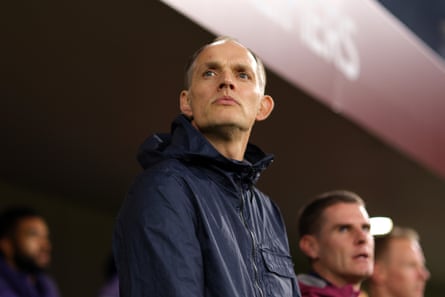“Right now, I could say that everything played out perfectly,” Thomas Tuchel says, as he reflects on having led England through qualifying to the World Cup finals: phase one of the mission complete. It does not feel incongruous for the head coach to talk about perfection – partly because he is constantly chasing it and also because, well, the results have been perfect.
When Tuchel’s team beat Albania 2-0 in Tirana on Sunday, it meant they topped their group with eight wins out of eight and with eight clean sheets. Never before has a European nation gone through World Cup qualification, playing at least six ties, without conceding. Spain will emulate them if they beat Turkey at home and keep a clean sheet in their sixth and final qualifier on Tuesday night. The only thing is that Tuchel knows perfection is unattainable – particularly in international football.
There have been many lessons for the German as he has lived his managerial crash course at this level, having officially started the job – his first in charge of a national team – in January. But perhaps the one that has guided him, certainly this season, is that he must not obsess over every tiny detail being just right; his gameplan cannot be a complex and beautiful mosaic.
Compromises must be made. Call them shortcuts; more attainable wins in the time available. They include smartness on set pieces, the nurturing of an all-for-one spirit, a ferocious desire to run and work. Tuchel’s assistant, Anthony Barry, made the point this month that “in international football, you will never create a team that can play the way the Barcelona of old did or the recent Manchester City”. Tuchel has warmed strongly to the theme.
“I have to accept and we have to accept as a staff that not everything can be perfect,” he says. “Because we have sometimes only one and a half training sessions to prepare matches. The players have to accept it, too. The level of detail cannot always be right.
“But the commitment to accept mistakes, the commitment after ball losses … to put the head down, to just run, run it off, this has been outstanding through the last camps. I think you can feel it. This is what I talked about [at the start] and I hope that somehow we make it so that you watch this team and you feel like: ‘Wow. They really mean it.’”

Tuchel was asked whether one of the biggest problems with England was that people expected perfection. There is surely something in this. The game in Tirana was not perfect and, had it finished at about the 60 minute mark, there would doubtless have been a fair bit of moaning. It was 0-0 and England had failed to open up Albania. The dynamism was missing.
The good news was that England found extra gears. They started to create chances. Tuchel’s substitutions were positive; they made an impact. England had signposted the breakthrough goal before Harry Kane scored it on a set piece. The captain would score again and, if all was well that ended well, England’s conviction in what they are doing under Tuchel coming to the fore, perhaps there was a lesson to be taken in the values of patience and perspective. “I am the first one [who wants perfection] and that does not exist,” Tuchel says. “It never exists, especially not in international camps. So the focus is on how we are with each other, how do players buy in, how is the commitment?”
England’s progress through the autumn has been built on clarity, Tuchel streamlining things, trying to simplify them. His most eye-catching move has been to define the formation with a 6, an 8 and a 10 in midfield, plus specialist wingers. And to tell every player where he sees them playing. No square pegs in round holes, which can be seen as a break from the past. The hierarchies in each position are part of the direction of travel.
That is not to say Tuchel is inflexible, particularly during games. In Tirana he switched to 4-1-4-1 when he introduced Phil Foden, playing him as one of two central attacking midfielders with Jude Bellingham. At the start of the game, he had John Stones step into midfield from central defence and England built in a 3-2-4-1.
Tuchel has pushed an identity to reflect the Premier League; he wants the players to feel reassured, liberated. That means athleticism, physicality, an aggressive tempo. The tweaks to combat the heat of North America next summer can be bolted on.
after newsletter promotion
It feels as though the selection is coming to a fine point, seven or eight of the likely starters easy to predict. The problem position remains left-back, where Nico O’Reilly did well enough over this past camp, playing ahead of Djed Spence and Myles Lewis-Skelly, who was dropped from the squad. Tino Livramento will return to the reckoning when he recovers from injury.

Will it be Ezri Konsa or Marc Guéhi alongside Stones in central defence? Marcus Rashford or Anthony Gordon on the left wing? Then, there is the No 10 position and Bellingham, whose frustrated reaction to being substituted late on in Tirana was the last thing Tuchel needed. It went against everything he has tried to instil.
Bellingham had been restored to the starting XI and he was determined to impress; it was almost as if he was trying too hard during a performance that mixed the good and bad before finishing with the ugly. Bellingham is capable of game-defining flashes and therein lies his magic. Does Tuchel want more than a spectacular-moments player in a position critical to his counter-press?
England have been here before. When they qualified for Euro 2016 under Roy Hodgson, they did so with 10 wins out of 10 – and everybody remembers how that tournament ended. The low quality of the opposition that Tuchel’s team have faced cannot be overlooked and he will be aware of the German saying about how a good horse only jumps as high as it has to.
Tuchel and his coaching staff may prefer to look at it another way. The qualification campaign has allowed them to focus mainly on what they do, building on their terms, generating momentum and confidence. When the players were stretched and had to deliver against Serbia in Belgrade in September, they did, winning 5-0 to locate an ignition point. Tuchel believes they will do so again.

.png) 3 months ago
55
3 months ago
55

















































